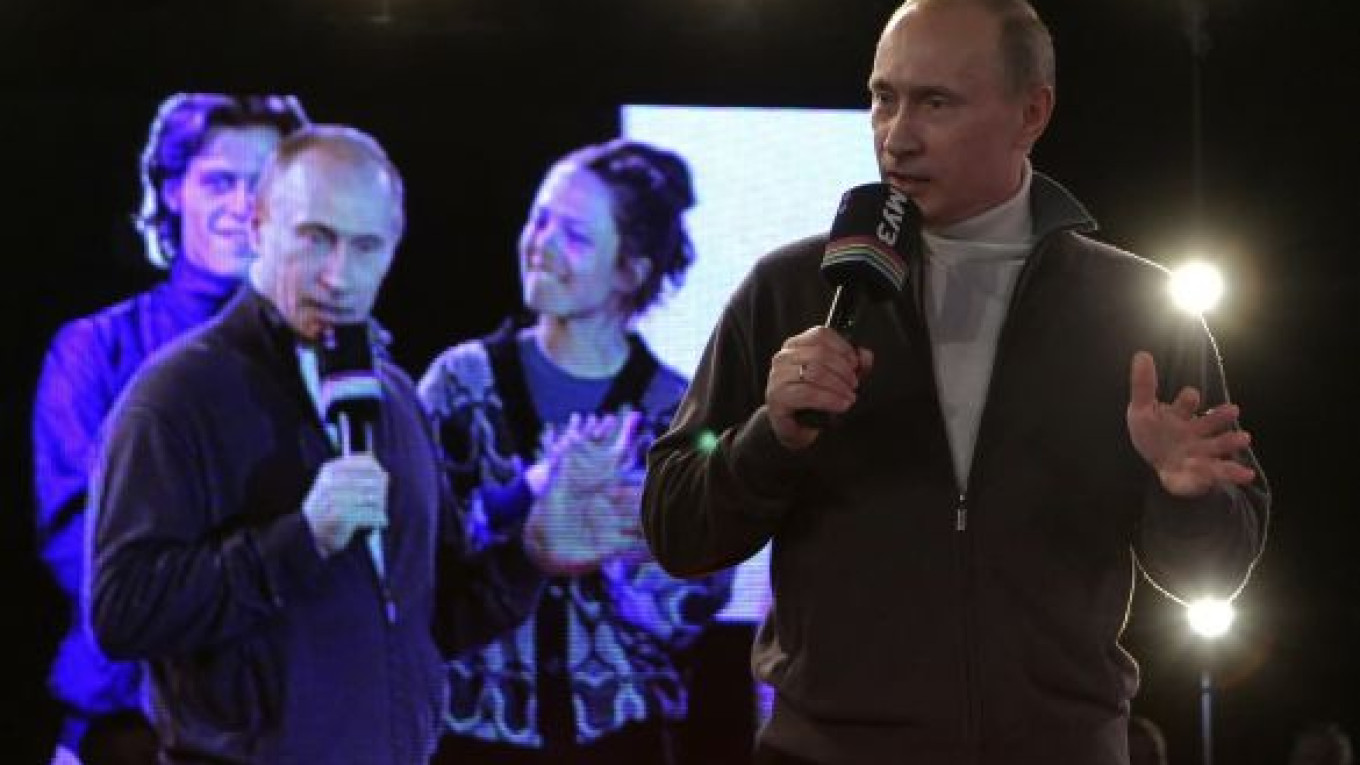Prime Minister Vladimir Putin said he thought that hip-hop could be a cure for alcohol and drug abuse and praised the country’s rappers for refining an otherwise alien culture by putting “Russian charm” into it.
Putin spoke during his first appearance on a hip-hop show, where he rubbed shoulders with performers in a subculture long associated with alcohol, drugs and violence.
“I do not think that the ‘top-rock’ or ‘floor-rock’ break dance technique is compatible with alcohol or drugs,” Putin said, speaking of problems that are rampant among the country’s youth.
He said “although rap is kind of rough, it has a social message dealing with problems of the young” and that graffiti had already become real art, “fine and elegant.”
Putin also said while phenomena like rap and break dancing showed their foreign origins by having English names, such an influx from abroad was unstoppable.
“Not everybody likes this, but we live in a peculiar time characterized by the penetration of cultures and customs. In politics and economics, we call that globalization,” he told the cheering crowd of hip-hop fans on “Fight for Respect,” which aired Friday night on Muz-TV.
Dressed in a white turtleneck sweater and a gray zipper jacket, Putin was quick to add why he has decided to embrace hip-hop on a national level. “I must admit that those young people who study this art in our country also inject their Russian charm into it,” he said.
And by using a variation of the Stalinist media policy “national in form, socialist in content,” Putin explained that any act, “regardless of national origin and name,” deserved attention “if it is talented in form and creative in content.”
Putin said he would like to see a global trend like hip-hop come from “Russian soil,” telling the laughing crowd that break dancing, hip-hop and graffiti were perhaps more entertaining than his country’s typical combination of “vodka, caviar and nesting dolls.”
Putin won lavish praise from the hip-hoppers, even though he often looked uncomfortably detached, standing in front of a dancing crowd, clapping his hands and not moving his body.
“It would be cool to write a track with him,” St. Petersburg rapper Roma Zhigan, one of the contest’s winners, sang in his thank you rap. “He is such a legendary man, he is our idol! Thanks to Muz-TV, thanks to the government of the Russian Federation.”
Hip-hop artists and their fans are not so closely associated to alcohol, drugs and violence in Russia as they are in the West, where several studies have found direct links between music and behavior. For example, a 2006 study published in the Journal of Studies on Alcohol found that young people are more likely to use alcohol and drugs and to behave in an aggressive manner if they listened to hip-hop.
But Russian rappers also have died from drug abuse. Zhigan, in his rap, offered a tribute to those rappers that included the line, “[They] passed away because of this s---.”
Putin took to the stage for a second time shortly before the end of the 20-minute show to respond to the tribute, and he struggled not to repeat the expletive.
When someone from the audience promptly shouted the singer’s proper quote, Putin dashed with the microphone to the corner of the stage, asking what had been said, “What did you say? Say it again!” When he got no reply, he said to the delight of the roaring crowd, “Because of s--- he said! Well right!”
Putin said performers who became addicts always saw their lives end in “degradation and tragedy.”
Putin’s spokesman Dmitry Peskov said the show was taped Wednesday.
He denied a media report that it had been staged just to promote the prime minister’s ratings, explaining that he had accepted an invitation from the all-music television channel.
“The sole intention was to promote healthier lifestyle among young people,” Peskov told The Moscow Times on Sunday.
Kommersant had called Putin’s decision to appear on “Fight for Respect” a “desperate step” motivated by his sagging ratings.
Putin’s approval ratings suffered a sharp fall last month, dropping 6 percentage points to 66 percent on Oct. 24 and 25, according to the pollster Public Opinion Foundation.
Founded in 1996, Muz-TV is part of the media holding of Uzbek-born metals magnate Alisher Usmanov. Usmanov also owns Kommersant.
A Message from The Moscow Times:
Dear readers,
We are facing unprecedented challenges. Russia's Prosecutor General's Office has designated The Moscow Times as an "undesirable" organization, criminalizing our work and putting our staff at risk of prosecution. This follows our earlier unjust labeling as a "foreign agent."
These actions are direct attempts to silence independent journalism in Russia. The authorities claim our work "discredits the decisions of the Russian leadership." We see things differently: we strive to provide accurate, unbiased reporting on Russia.
We, the journalists of The Moscow Times, refuse to be silenced. But to continue our work, we need your help.
Your support, no matter how small, makes a world of difference. If you can, please support us monthly starting from just $2. It's quick to set up, and every contribution makes a significant impact.
By supporting The Moscow Times, you're defending open, independent journalism in the face of repression. Thank you for standing with us.
Remind me later.


